Business Law Report: Partnership Act and Director's Legal Obligations
VerifiedAdded on 2021/06/17
|8
|2302
|42
Report
AI Summary
This report delves into key aspects of Australian business law, commencing with an analysis of partnerships under The Partnership Act 1963 (Cth). It examines the criteria for establishing a partnership, differentiating it from other business arrangements, and applies these principles to a case study involving Samuel, Thomas, and Peta. The report then transitions to a discussion of directors' duties, specifically focusing on the duties of care and diligence as outlined in the Corporations Act 2001 (Cth), including consequences for non-compliance and relevant case law. Furthermore, it explores the duties of loyalty and good faith, examining their scope, application, and the significance of acting in the best interests of the company. The analysis incorporates relevant legal precedents to illustrate the practical implications of these duties, providing a comprehensive overview of corporate governance responsibilities.
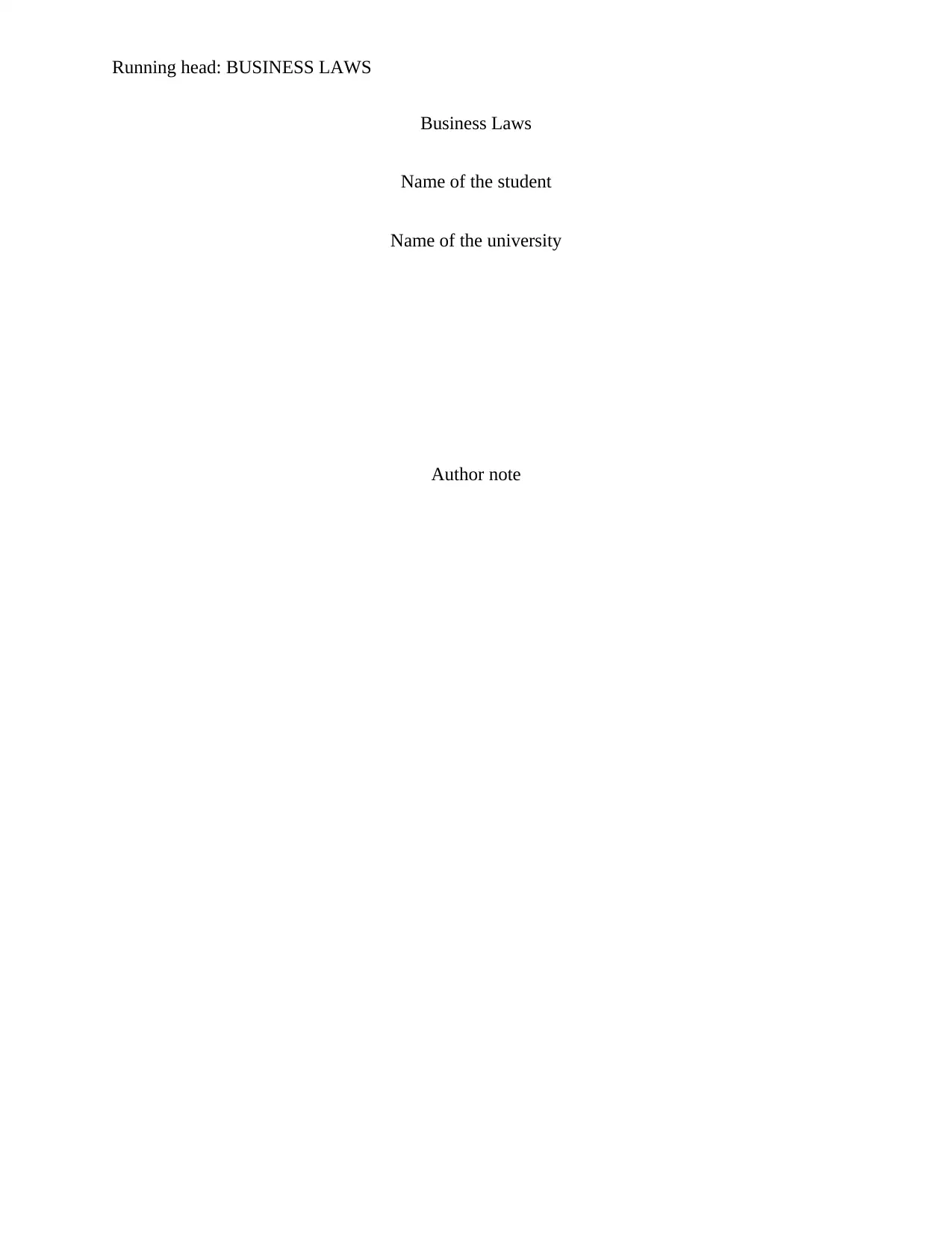
Running head: BUSINESS LAWS
Business Laws
Name of the student
Name of the university
Author note
Business Laws
Name of the student
Name of the university
Author note
Paraphrase This Document
Need a fresh take? Get an instant paraphrase of this document with our AI Paraphraser
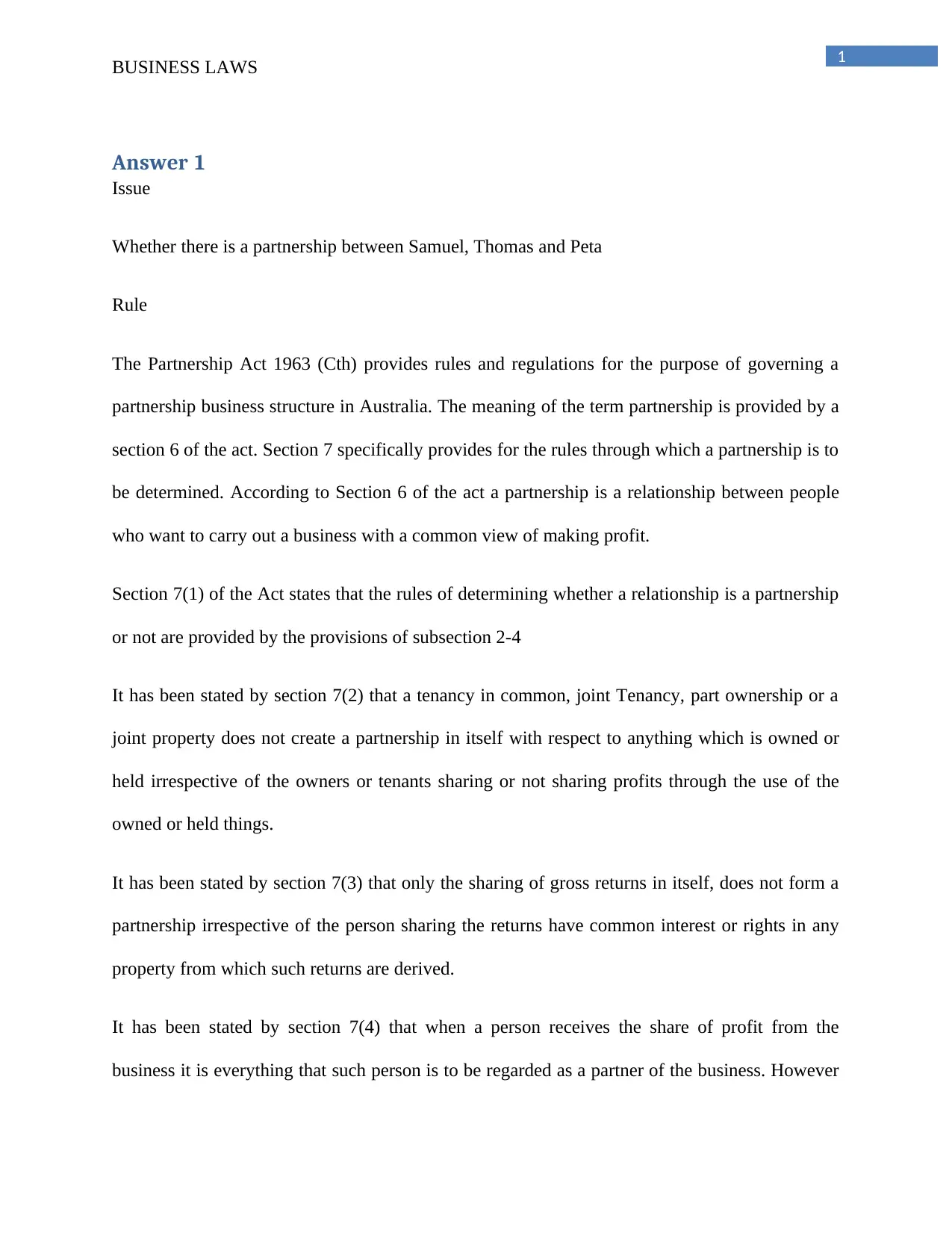
1
BUSINESS LAWS
Answer 1
Issue
Whether there is a partnership between Samuel, Thomas and Peta
Rule
The Partnership Act 1963 (Cth) provides rules and regulations for the purpose of governing a
partnership business structure in Australia. The meaning of the term partnership is provided by a
section 6 of the act. Section 7 specifically provides for the rules through which a partnership is to
be determined. According to Section 6 of the act a partnership is a relationship between people
who want to carry out a business with a common view of making profit.
Section 7(1) of the Act states that the rules of determining whether a relationship is a partnership
or not are provided by the provisions of subsection 2-4
It has been stated by section 7(2) that a tenancy in common, joint Tenancy, part ownership or a
joint property does not create a partnership in itself with respect to anything which is owned or
held irrespective of the owners or tenants sharing or not sharing profits through the use of the
owned or held things.
It has been stated by section 7(3) that only the sharing of gross returns in itself, does not form a
partnership irrespective of the person sharing the returns have common interest or rights in any
property from which such returns are derived.
It has been stated by section 7(4) that when a person receives the share of profit from the
business it is everything that such person is to be regarded as a partner of the business. However
BUSINESS LAWS
Answer 1
Issue
Whether there is a partnership between Samuel, Thomas and Peta
Rule
The Partnership Act 1963 (Cth) provides rules and regulations for the purpose of governing a
partnership business structure in Australia. The meaning of the term partnership is provided by a
section 6 of the act. Section 7 specifically provides for the rules through which a partnership is to
be determined. According to Section 6 of the act a partnership is a relationship between people
who want to carry out a business with a common view of making profit.
Section 7(1) of the Act states that the rules of determining whether a relationship is a partnership
or not are provided by the provisions of subsection 2-4
It has been stated by section 7(2) that a tenancy in common, joint Tenancy, part ownership or a
joint property does not create a partnership in itself with respect to anything which is owned or
held irrespective of the owners or tenants sharing or not sharing profits through the use of the
owned or held things.
It has been stated by section 7(3) that only the sharing of gross returns in itself, does not form a
partnership irrespective of the person sharing the returns have common interest or rights in any
property from which such returns are derived.
It has been stated by section 7(4) that when a person receives the share of profit from the
business it is everything that such person is to be regarded as a partner of the business. However
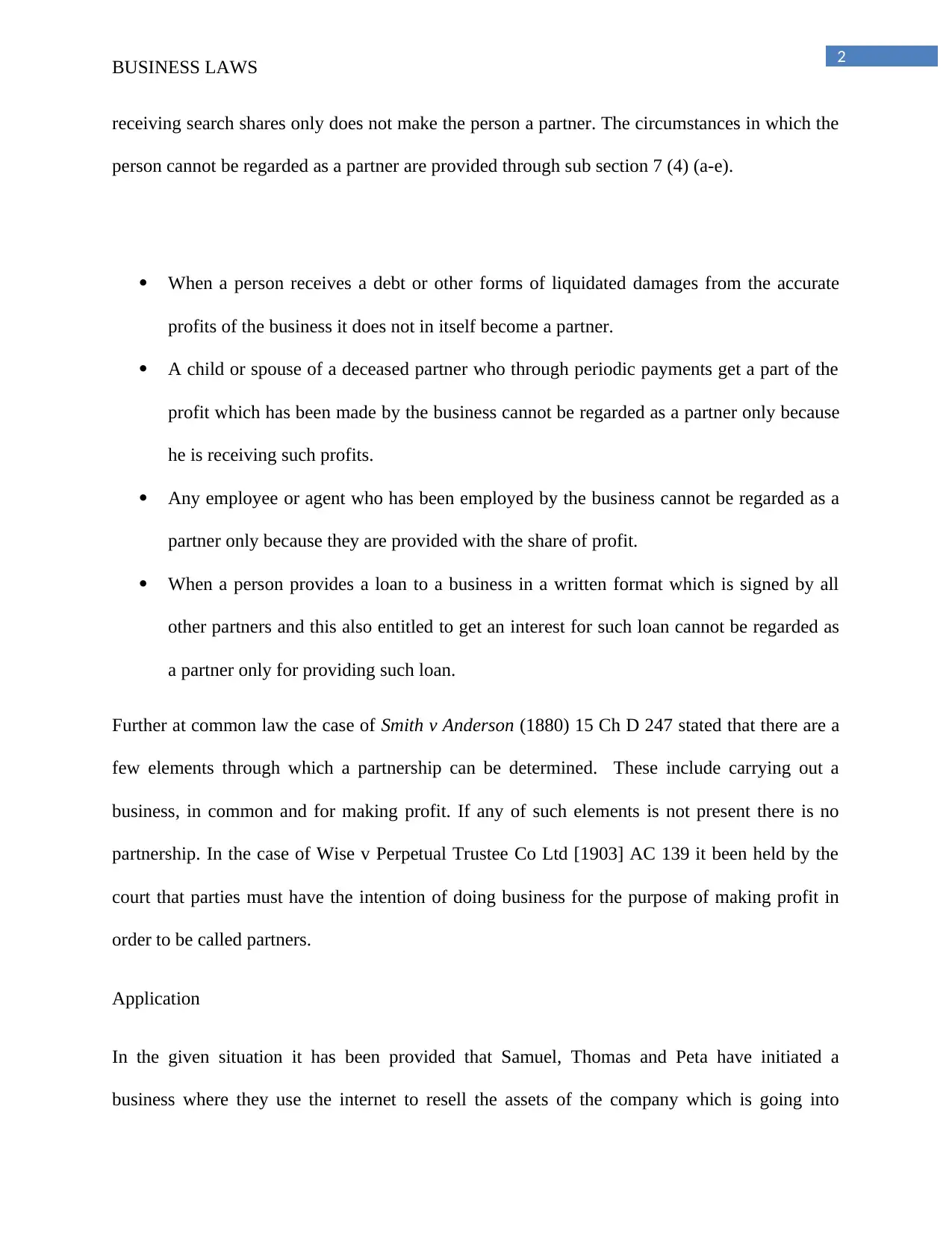
2
BUSINESS LAWS
receiving search shares only does not make the person a partner. The circumstances in which the
person cannot be regarded as a partner are provided through sub section 7 (4) (a-e).
When a person receives a debt or other forms of liquidated damages from the accurate
profits of the business it does not in itself become a partner.
A child or spouse of a deceased partner who through periodic payments get a part of the
profit which has been made by the business cannot be regarded as a partner only because
he is receiving such profits.
Any employee or agent who has been employed by the business cannot be regarded as a
partner only because they are provided with the share of profit.
When a person provides a loan to a business in a written format which is signed by all
other partners and this also entitled to get an interest for such loan cannot be regarded as
a partner only for providing such loan.
Further at common law the case of Smith v Anderson (1880) 15 Ch D 247 stated that there are a
few elements through which a partnership can be determined. These include carrying out a
business, in common and for making profit. If any of such elements is not present there is no
partnership. In the case of Wise v Perpetual Trustee Co Ltd [1903] AC 139 it been held by the
court that parties must have the intention of doing business for the purpose of making profit in
order to be called partners.
Application
In the given situation it has been provided that Samuel, Thomas and Peta have initiated a
business where they use the internet to resell the assets of the company which is going into
BUSINESS LAWS
receiving search shares only does not make the person a partner. The circumstances in which the
person cannot be regarded as a partner are provided through sub section 7 (4) (a-e).
When a person receives a debt or other forms of liquidated damages from the accurate
profits of the business it does not in itself become a partner.
A child or spouse of a deceased partner who through periodic payments get a part of the
profit which has been made by the business cannot be regarded as a partner only because
he is receiving such profits.
Any employee or agent who has been employed by the business cannot be regarded as a
partner only because they are provided with the share of profit.
When a person provides a loan to a business in a written format which is signed by all
other partners and this also entitled to get an interest for such loan cannot be regarded as
a partner only for providing such loan.
Further at common law the case of Smith v Anderson (1880) 15 Ch D 247 stated that there are a
few elements through which a partnership can be determined. These include carrying out a
business, in common and for making profit. If any of such elements is not present there is no
partnership. In the case of Wise v Perpetual Trustee Co Ltd [1903] AC 139 it been held by the
court that parties must have the intention of doing business for the purpose of making profit in
order to be called partners.
Application
In the given situation it has been provided that Samuel, Thomas and Peta have initiated a
business where they use the internet to resell the assets of the company which is going into
⊘ This is a preview!⊘
Do you want full access?
Subscribe today to unlock all pages.

Trusted by 1+ million students worldwide
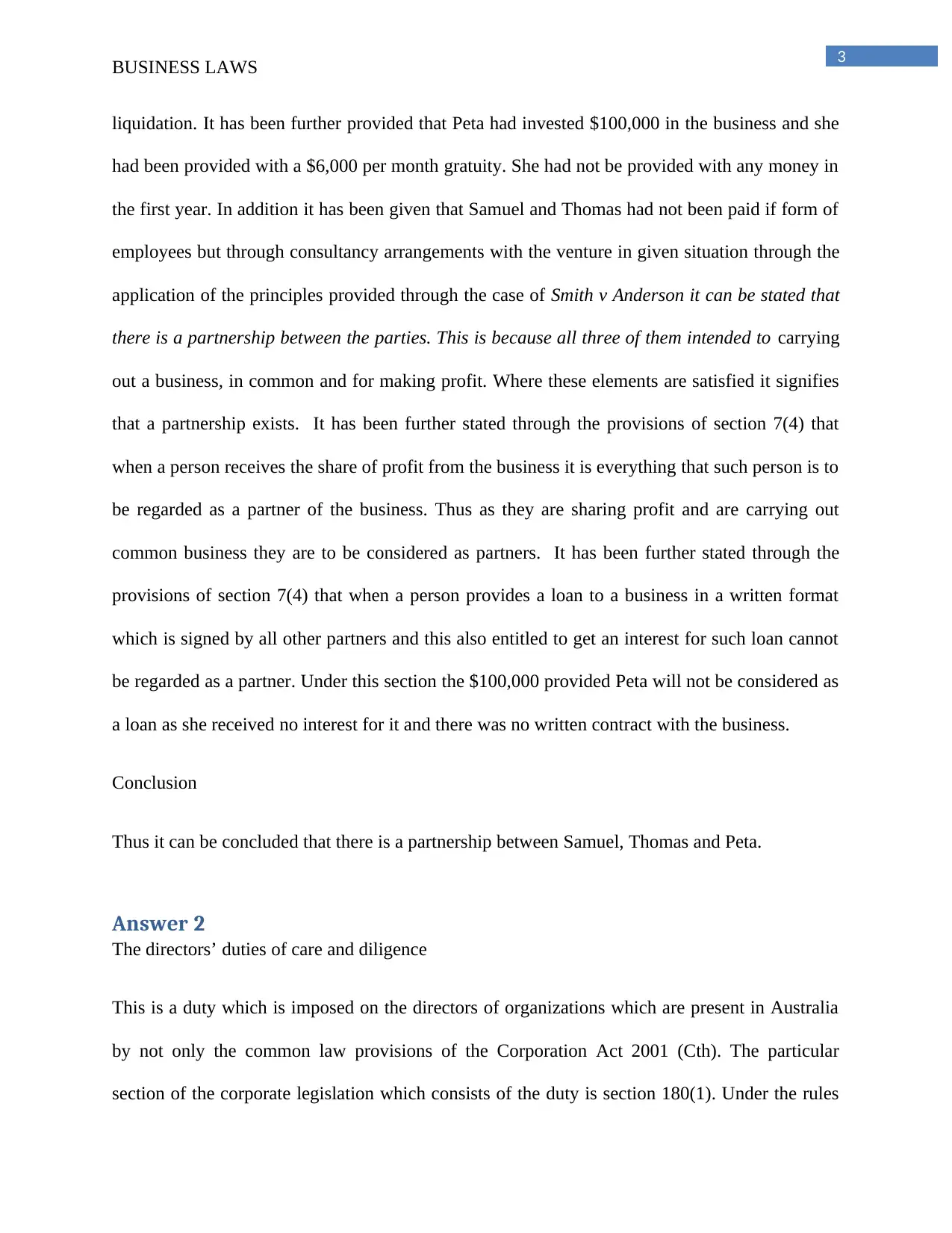
3
BUSINESS LAWS
liquidation. It has been further provided that Peta had invested $100,000 in the business and she
had been provided with a $6,000 per month gratuity. She had not be provided with any money in
the first year. In addition it has been given that Samuel and Thomas had not been paid if form of
employees but through consultancy arrangements with the venture in given situation through the
application of the principles provided through the case of Smith v Anderson it can be stated that
there is a partnership between the parties. This is because all three of them intended to carrying
out a business, in common and for making profit. Where these elements are satisfied it signifies
that a partnership exists. It has been further stated through the provisions of section 7(4) that
when a person receives the share of profit from the business it is everything that such person is to
be regarded as a partner of the business. Thus as they are sharing profit and are carrying out
common business they are to be considered as partners. It has been further stated through the
provisions of section 7(4) that when a person provides a loan to a business in a written format
which is signed by all other partners and this also entitled to get an interest for such loan cannot
be regarded as a partner. Under this section the $100,000 provided Peta will not be considered as
a loan as she received no interest for it and there was no written contract with the business.
Conclusion
Thus it can be concluded that there is a partnership between Samuel, Thomas and Peta.
Answer 2
The directors’ duties of care and diligence
This is a duty which is imposed on the directors of organizations which are present in Australia
by not only the common law provisions of the Corporation Act 2001 (Cth). The particular
section of the corporate legislation which consists of the duty is section 180(1). Under the rules
BUSINESS LAWS
liquidation. It has been further provided that Peta had invested $100,000 in the business and she
had been provided with a $6,000 per month gratuity. She had not be provided with any money in
the first year. In addition it has been given that Samuel and Thomas had not been paid if form of
employees but through consultancy arrangements with the venture in given situation through the
application of the principles provided through the case of Smith v Anderson it can be stated that
there is a partnership between the parties. This is because all three of them intended to carrying
out a business, in common and for making profit. Where these elements are satisfied it signifies
that a partnership exists. It has been further stated through the provisions of section 7(4) that
when a person receives the share of profit from the business it is everything that such person is to
be regarded as a partner of the business. Thus as they are sharing profit and are carrying out
common business they are to be considered as partners. It has been further stated through the
provisions of section 7(4) that when a person provides a loan to a business in a written format
which is signed by all other partners and this also entitled to get an interest for such loan cannot
be regarded as a partner. Under this section the $100,000 provided Peta will not be considered as
a loan as she received no interest for it and there was no written contract with the business.
Conclusion
Thus it can be concluded that there is a partnership between Samuel, Thomas and Peta.
Answer 2
The directors’ duties of care and diligence
This is a duty which is imposed on the directors of organizations which are present in Australia
by not only the common law provisions of the Corporation Act 2001 (Cth). The particular
section of the corporate legislation which consists of the duty is section 180(1). Under the rules
Paraphrase This Document
Need a fresh take? Get an instant paraphrase of this document with our AI Paraphraser
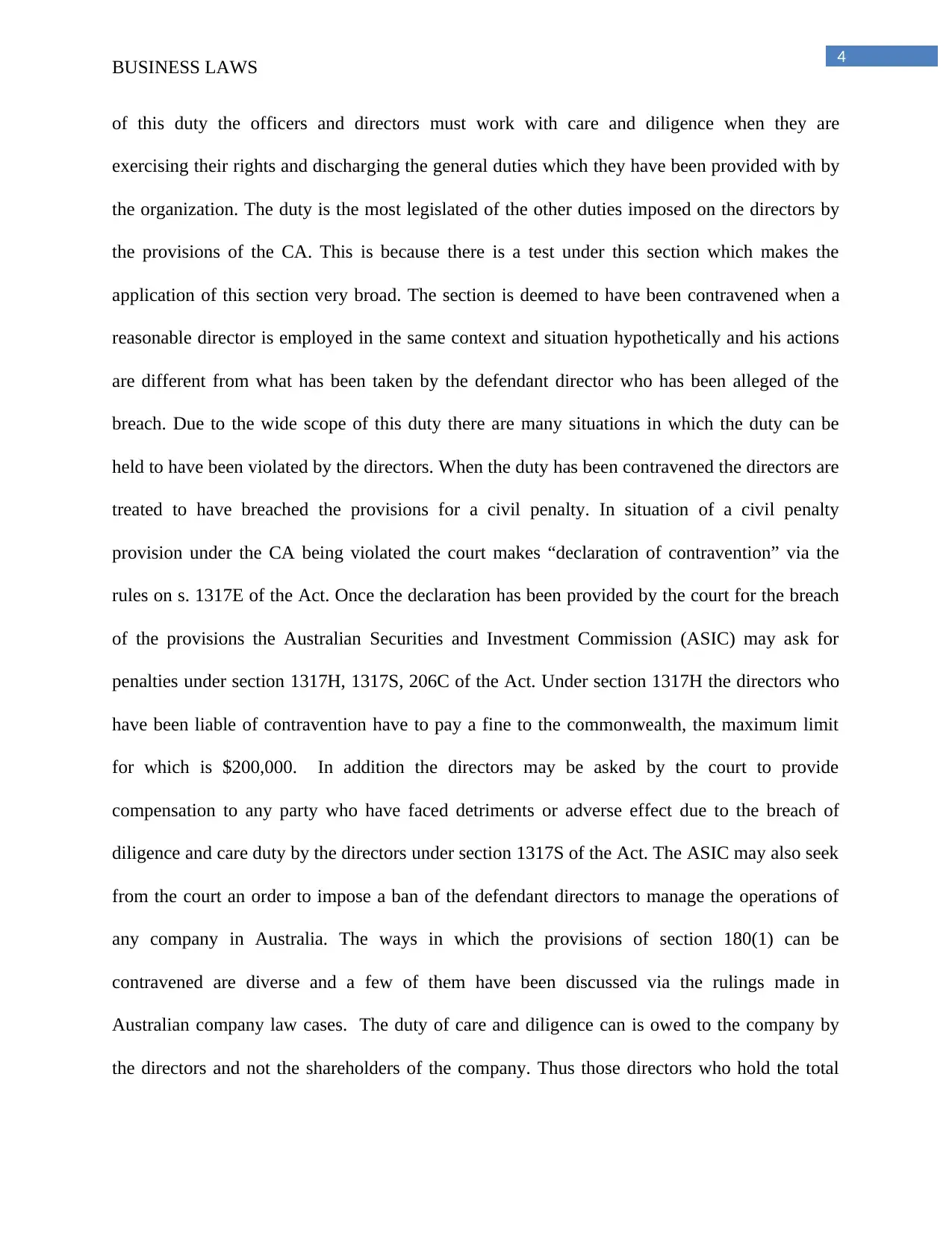
4
BUSINESS LAWS
of this duty the officers and directors must work with care and diligence when they are
exercising their rights and discharging the general duties which they have been provided with by
the organization. The duty is the most legislated of the other duties imposed on the directors by
the provisions of the CA. This is because there is a test under this section which makes the
application of this section very broad. The section is deemed to have been contravened when a
reasonable director is employed in the same context and situation hypothetically and his actions
are different from what has been taken by the defendant director who has been alleged of the
breach. Due to the wide scope of this duty there are many situations in which the duty can be
held to have been violated by the directors. When the duty has been contravened the directors are
treated to have breached the provisions for a civil penalty. In situation of a civil penalty
provision under the CA being violated the court makes “declaration of contravention” via the
rules on s. 1317E of the Act. Once the declaration has been provided by the court for the breach
of the provisions the Australian Securities and Investment Commission (ASIC) may ask for
penalties under section 1317H, 1317S, 206C of the Act. Under section 1317H the directors who
have been liable of contravention have to pay a fine to the commonwealth, the maximum limit
for which is $200,000. In addition the directors may be asked by the court to provide
compensation to any party who have faced detriments or adverse effect due to the breach of
diligence and care duty by the directors under section 1317S of the Act. The ASIC may also seek
from the court an order to impose a ban of the defendant directors to manage the operations of
any company in Australia. The ways in which the provisions of section 180(1) can be
contravened are diverse and a few of them have been discussed via the rulings made in
Australian company law cases. The duty of care and diligence can is owed to the company by
the directors and not the shareholders of the company. Thus those directors who hold the total
BUSINESS LAWS
of this duty the officers and directors must work with care and diligence when they are
exercising their rights and discharging the general duties which they have been provided with by
the organization. The duty is the most legislated of the other duties imposed on the directors by
the provisions of the CA. This is because there is a test under this section which makes the
application of this section very broad. The section is deemed to have been contravened when a
reasonable director is employed in the same context and situation hypothetically and his actions
are different from what has been taken by the defendant director who has been alleged of the
breach. Due to the wide scope of this duty there are many situations in which the duty can be
held to have been violated by the directors. When the duty has been contravened the directors are
treated to have breached the provisions for a civil penalty. In situation of a civil penalty
provision under the CA being violated the court makes “declaration of contravention” via the
rules on s. 1317E of the Act. Once the declaration has been provided by the court for the breach
of the provisions the Australian Securities and Investment Commission (ASIC) may ask for
penalties under section 1317H, 1317S, 206C of the Act. Under section 1317H the directors who
have been liable of contravention have to pay a fine to the commonwealth, the maximum limit
for which is $200,000. In addition the directors may be asked by the court to provide
compensation to any party who have faced detriments or adverse effect due to the breach of
diligence and care duty by the directors under section 1317S of the Act. The ASIC may also seek
from the court an order to impose a ban of the defendant directors to manage the operations of
any company in Australia. The ways in which the provisions of section 180(1) can be
contravened are diverse and a few of them have been discussed via the rulings made in
Australian company law cases. The duty of care and diligence can is owed to the company by
the directors and not the shareholders of the company. Thus those directors who hold the total
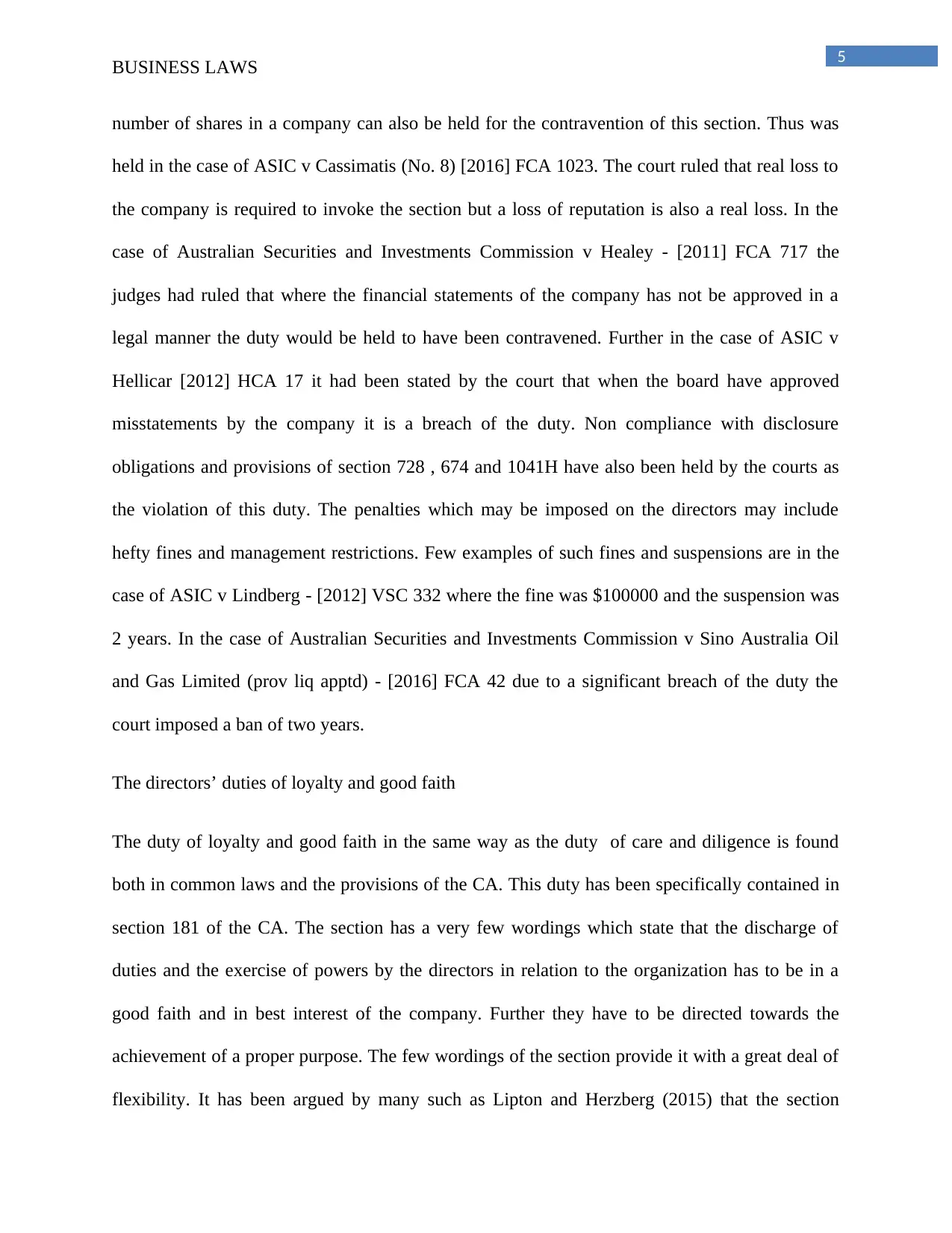
5
BUSINESS LAWS
number of shares in a company can also be held for the contravention of this section. Thus was
held in the case of ASIC v Cassimatis (No. 8) [2016] FCA 1023. The court ruled that real loss to
the company is required to invoke the section but a loss of reputation is also a real loss. In the
case of Australian Securities and Investments Commission v Healey - [2011] FCA 717 the
judges had ruled that where the financial statements of the company has not be approved in a
legal manner the duty would be held to have been contravened. Further in the case of ASIC v
Hellicar [2012] HCA 17 it had been stated by the court that when the board have approved
misstatements by the company it is a breach of the duty. Non compliance with disclosure
obligations and provisions of section 728 , 674 and 1041H have also been held by the courts as
the violation of this duty. The penalties which may be imposed on the directors may include
hefty fines and management restrictions. Few examples of such fines and suspensions are in the
case of ASIC v Lindberg - [2012] VSC 332 where the fine was $100000 and the suspension was
2 years. In the case of Australian Securities and Investments Commission v Sino Australia Oil
and Gas Limited (prov liq apptd) - [2016] FCA 42 due to a significant breach of the duty the
court imposed a ban of two years.
The directors’ duties of loyalty and good faith
The duty of loyalty and good faith in the same way as the duty of care and diligence is found
both in common laws and the provisions of the CA. This duty has been specifically contained in
section 181 of the CA. The section has a very few wordings which state that the discharge of
duties and the exercise of powers by the directors in relation to the organization has to be in a
good faith and in best interest of the company. Further they have to be directed towards the
achievement of a proper purpose. The few wordings of the section provide it with a great deal of
flexibility. It has been argued by many such as Lipton and Herzberg (2015) that the section
BUSINESS LAWS
number of shares in a company can also be held for the contravention of this section. Thus was
held in the case of ASIC v Cassimatis (No. 8) [2016] FCA 1023. The court ruled that real loss to
the company is required to invoke the section but a loss of reputation is also a real loss. In the
case of Australian Securities and Investments Commission v Healey - [2011] FCA 717 the
judges had ruled that where the financial statements of the company has not be approved in a
legal manner the duty would be held to have been contravened. Further in the case of ASIC v
Hellicar [2012] HCA 17 it had been stated by the court that when the board have approved
misstatements by the company it is a breach of the duty. Non compliance with disclosure
obligations and provisions of section 728 , 674 and 1041H have also been held by the courts as
the violation of this duty. The penalties which may be imposed on the directors may include
hefty fines and management restrictions. Few examples of such fines and suspensions are in the
case of ASIC v Lindberg - [2012] VSC 332 where the fine was $100000 and the suspension was
2 years. In the case of Australian Securities and Investments Commission v Sino Australia Oil
and Gas Limited (prov liq apptd) - [2016] FCA 42 due to a significant breach of the duty the
court imposed a ban of two years.
The directors’ duties of loyalty and good faith
The duty of loyalty and good faith in the same way as the duty of care and diligence is found
both in common laws and the provisions of the CA. This duty has been specifically contained in
section 181 of the CA. The section has a very few wordings which state that the discharge of
duties and the exercise of powers by the directors in relation to the organization has to be in a
good faith and in best interest of the company. Further they have to be directed towards the
achievement of a proper purpose. The few wordings of the section provide it with a great deal of
flexibility. It has been argued by many such as Lipton and Herzberg (2015) that the section
⊘ This is a preview!⊘
Do you want full access?
Subscribe today to unlock all pages.

Trusted by 1+ million students worldwide
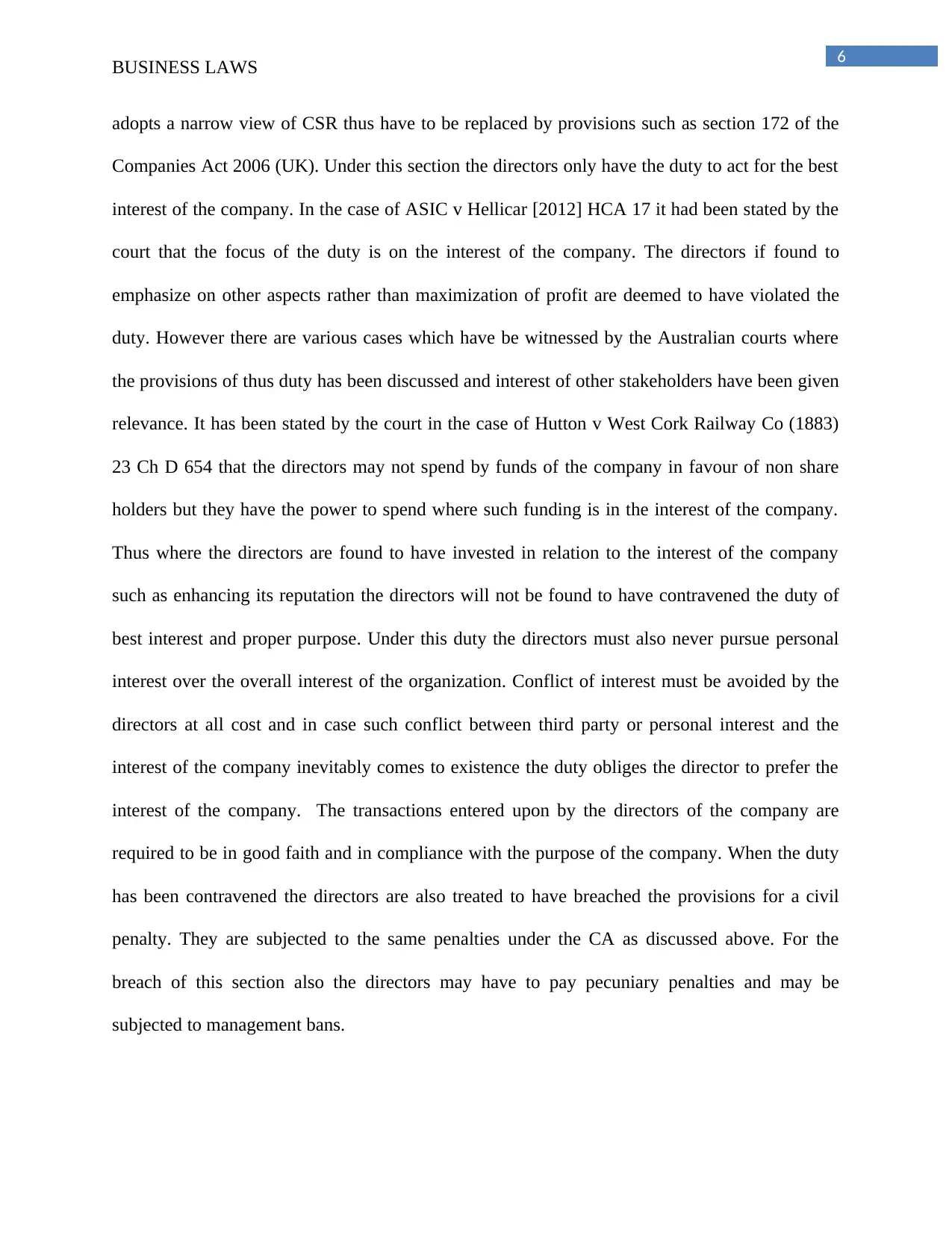
6
BUSINESS LAWS
adopts a narrow view of CSR thus have to be replaced by provisions such as section 172 of the
Companies Act 2006 (UK). Under this section the directors only have the duty to act for the best
interest of the company. In the case of ASIC v Hellicar [2012] HCA 17 it had been stated by the
court that the focus of the duty is on the interest of the company. The directors if found to
emphasize on other aspects rather than maximization of profit are deemed to have violated the
duty. However there are various cases which have be witnessed by the Australian courts where
the provisions of thus duty has been discussed and interest of other stakeholders have been given
relevance. It has been stated by the court in the case of Hutton v West Cork Railway Co (1883)
23 Ch D 654 that the directors may not spend by funds of the company in favour of non share
holders but they have the power to spend where such funding is in the interest of the company.
Thus where the directors are found to have invested in relation to the interest of the company
such as enhancing its reputation the directors will not be found to have contravened the duty of
best interest and proper purpose. Under this duty the directors must also never pursue personal
interest over the overall interest of the organization. Conflict of interest must be avoided by the
directors at all cost and in case such conflict between third party or personal interest and the
interest of the company inevitably comes to existence the duty obliges the director to prefer the
interest of the company. The transactions entered upon by the directors of the company are
required to be in good faith and in compliance with the purpose of the company. When the duty
has been contravened the directors are also treated to have breached the provisions for a civil
penalty. They are subjected to the same penalties under the CA as discussed above. For the
breach of this section also the directors may have to pay pecuniary penalties and may be
subjected to management bans.
BUSINESS LAWS
adopts a narrow view of CSR thus have to be replaced by provisions such as section 172 of the
Companies Act 2006 (UK). Under this section the directors only have the duty to act for the best
interest of the company. In the case of ASIC v Hellicar [2012] HCA 17 it had been stated by the
court that the focus of the duty is on the interest of the company. The directors if found to
emphasize on other aspects rather than maximization of profit are deemed to have violated the
duty. However there are various cases which have be witnessed by the Australian courts where
the provisions of thus duty has been discussed and interest of other stakeholders have been given
relevance. It has been stated by the court in the case of Hutton v West Cork Railway Co (1883)
23 Ch D 654 that the directors may not spend by funds of the company in favour of non share
holders but they have the power to spend where such funding is in the interest of the company.
Thus where the directors are found to have invested in relation to the interest of the company
such as enhancing its reputation the directors will not be found to have contravened the duty of
best interest and proper purpose. Under this duty the directors must also never pursue personal
interest over the overall interest of the organization. Conflict of interest must be avoided by the
directors at all cost and in case such conflict between third party or personal interest and the
interest of the company inevitably comes to existence the duty obliges the director to prefer the
interest of the company. The transactions entered upon by the directors of the company are
required to be in good faith and in compliance with the purpose of the company. When the duty
has been contravened the directors are also treated to have breached the provisions for a civil
penalty. They are subjected to the same penalties under the CA as discussed above. For the
breach of this section also the directors may have to pay pecuniary penalties and may be
subjected to management bans.
Paraphrase This Document
Need a fresh take? Get an instant paraphrase of this document with our AI Paraphraser
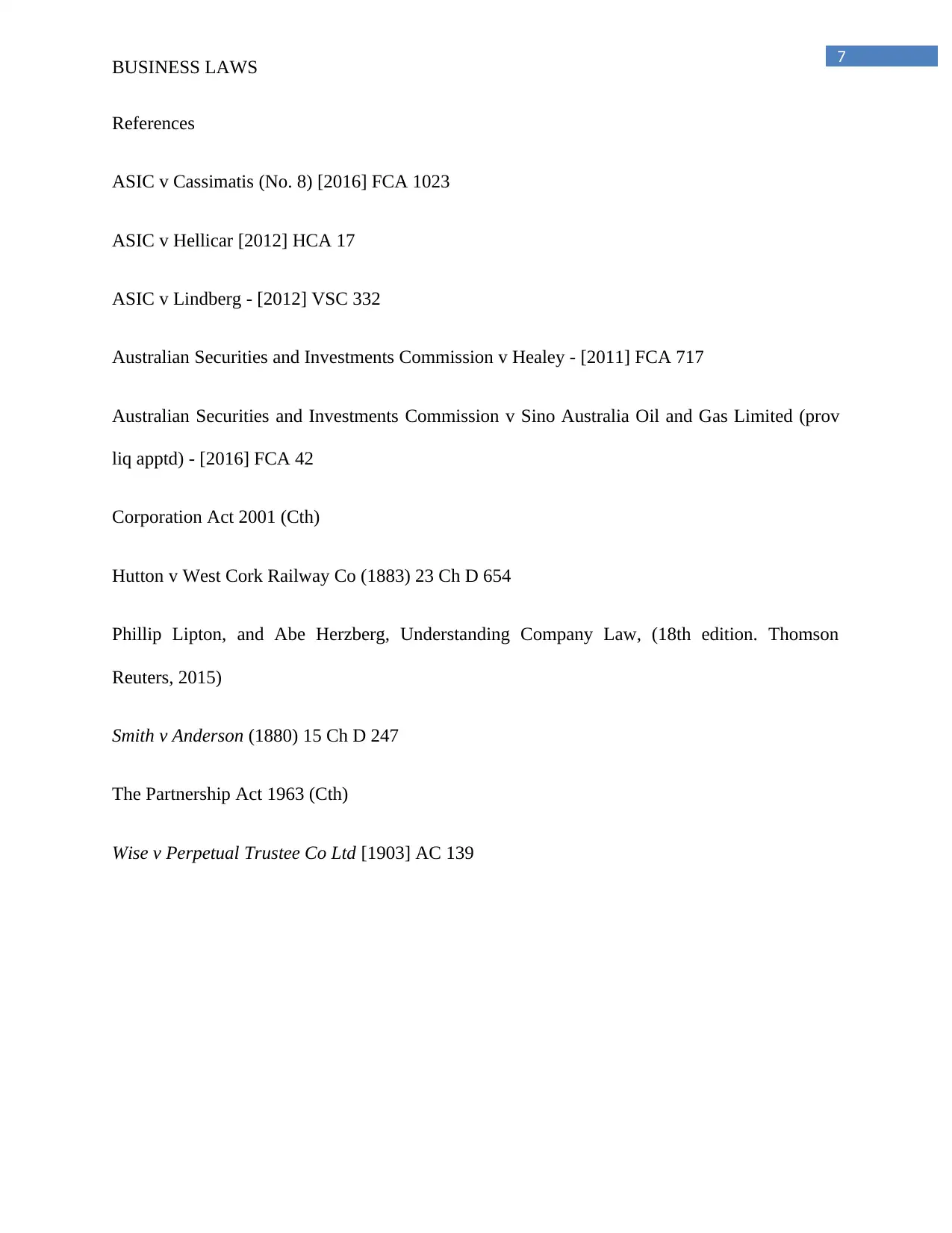
7
BUSINESS LAWS
References
ASIC v Cassimatis (No. 8) [2016] FCA 1023
ASIC v Hellicar [2012] HCA 17
ASIC v Lindberg - [2012] VSC 332
Australian Securities and Investments Commission v Healey - [2011] FCA 717
Australian Securities and Investments Commission v Sino Australia Oil and Gas Limited (prov
liq apptd) - [2016] FCA 42
Corporation Act 2001 (Cth)
Hutton v West Cork Railway Co (1883) 23 Ch D 654
Phillip Lipton, and Abe Herzberg, Understanding Company Law, (18th edition. Thomson
Reuters, 2015)
Smith v Anderson (1880) 15 Ch D 247
The Partnership Act 1963 (Cth)
Wise v Perpetual Trustee Co Ltd [1903] AC 139
BUSINESS LAWS
References
ASIC v Cassimatis (No. 8) [2016] FCA 1023
ASIC v Hellicar [2012] HCA 17
ASIC v Lindberg - [2012] VSC 332
Australian Securities and Investments Commission v Healey - [2011] FCA 717
Australian Securities and Investments Commission v Sino Australia Oil and Gas Limited (prov
liq apptd) - [2016] FCA 42
Corporation Act 2001 (Cth)
Hutton v West Cork Railway Co (1883) 23 Ch D 654
Phillip Lipton, and Abe Herzberg, Understanding Company Law, (18th edition. Thomson
Reuters, 2015)
Smith v Anderson (1880) 15 Ch D 247
The Partnership Act 1963 (Cth)
Wise v Perpetual Trustee Co Ltd [1903] AC 139
1 out of 8
Related Documents
Your All-in-One AI-Powered Toolkit for Academic Success.
+13062052269
info@desklib.com
Available 24*7 on WhatsApp / Email
![[object Object]](/_next/static/media/star-bottom.7253800d.svg)
Unlock your academic potential
Copyright © 2020–2026 A2Z Services. All Rights Reserved. Developed and managed by ZUCOL.



